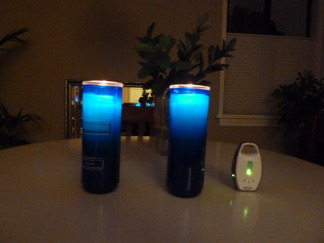shelf space
/In the living room, on the end table, under the lamp, is a plaque commemorating the hundred trees that M.’s mother and stepfather had planted in Zoey and Gus’s memory.
Across the room, on the built-in shelf, are two large photographs: one of Gus’s name etched in the sand of an Australian beach, the other of Zoey’s. The pictures were put there by my mother-in-law, who moved them to this place of prominence in the hours before we brought home Gus and Zoey’s siblings, Ben and Ellie. In each picture, the name appears beyond the reach of a wave that would lap it into nothingness, and underneath the sun as it gives a goodnight kiss to the horizon. Of course, this was only my assumption: that when the pictures were taken, it was just before night, not dawn.
In the den, on top of the bookcase, sits a wicker basket. The basket contains the rest of the physical evidence of Gus and Zoey: sonogram pictures, a hospital wristband, a receipt from the purchase of the baby furniture (and a receipt from the refund), condolence cards, and more. Some of it is gathered in the scrapbook M.’s mother began, not realizing that the one she bought matched the paper from our wedding invitations. Some of it is not.
If the house were on fire, the basket may be the one thing I would save that is not a person or a dog. But on the days when there is no fire, it is something I don’t always think very much about. Something I see without seeing. On those days I see not the basket, but a basket-shape—a shape nestled among a vase-shape and box-shapes and oversized-stuffed-animal-shapes.
Still, inside the basket, there are a few objects I think about more often than the rest: six Polaroids of Gus and Zoey taken by the hospital after their deaths. Though closely related, these pictures are not like the company they keep in the basket. They are not sign-in sheets or parking medallions or the page torn from a hospital room’s wall calendar. They are not symbols or signifiers. They are the most direct evidence there is that our babies ever were.
---
Since Ben and Ellie’s births, I have taken approximately 2,400 pictures (although I am frequently reminded that many include, or are simply of, the dog). Of Gus and Zoey we have just three each. Worse still, they are not very good. They are cold and clinical and seem chemically unstable. As if being kept out in the light just extra moment would erase the likenesses entrusted to them.
Polaroids of the dead. What else would you expect?
I last saw these images of Gus and Zoey the week Ben and Ellie came home. Almost a month earlier, during one of our last doctor’s visits, I remarked to M. that when these babies arrive, they will look huge. Consider our frame of reference, after all. But later, when M. was looking at the Polaroids—this time as a new mother—and I glanced down, I was staggered by Gus and Zoey’s smallness, by their fragility, even though they were already gone. In fact, for just a sliver of a moment, I did not realize I was looking at babies, let alone at my own. This was what Ben and Ellie had accomplished after just ten days of life: swapping their side of the prism for Gus and Zoey’s.
Several times in those first weeks Ben and Ellie were with us, M. commented on how much Ben looked like Gus. Now she says Ben looks like me. As he fills in, his resemblance to Gus fades. And as the resemblance fades, the before-and-after line that separates the loss of one pair from the arrival of the other seems to grow wider and more impermeable. So I am making a place inside myself for a paradox: I have two sons, but my sons have no brothers.
We make places for lots of things. We keep the physical ones—mementos, totems, emblems, symbols—because they are powerful. But their power is not just the power to make us remember; it is the power to make real, if only for a moment, a space where two states overlap: the state of having and the state of once having had.
What objects embody the memory of your lost child or children? Does looking at them bring you comfort or refresh your grief? Were you surprised by any of the items you found meaningful and wanted to keep?


